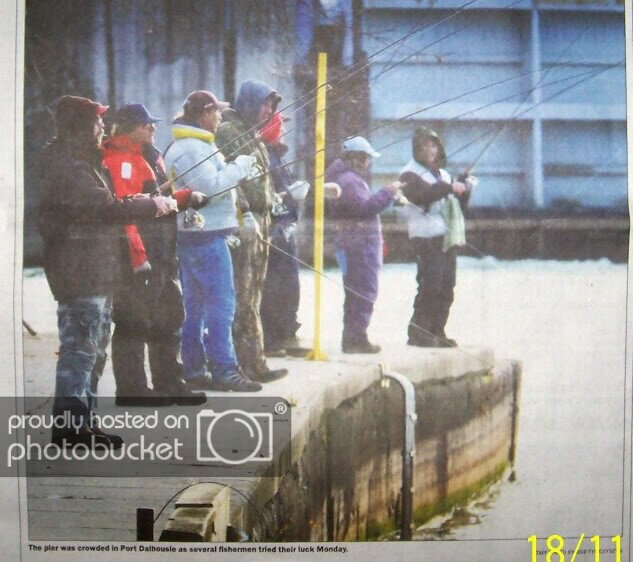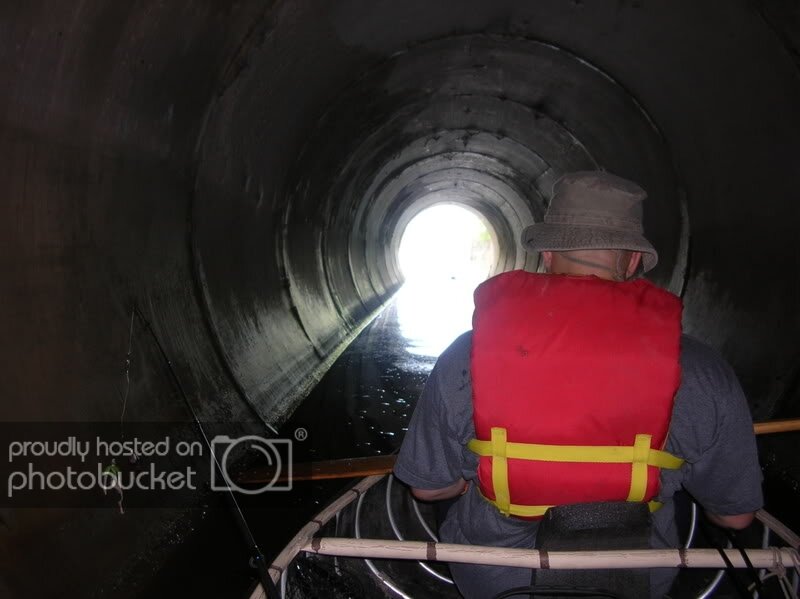

knightfisher
-
Posts
237 -
Joined
-
Last visited
-
Days Won
2
Content Type
Events
Profiles
Forums
Store
Posts posted by knightfisher
-
-
Not all Police Officers carry Tazer's in Ontario, just so you know! And a tazer saves lives, cause if there was no tazers and a police officer had to protect himself he would shoot. I would rather be tazed than shot!! For the person complaining about the non-motorized fines....there are alot of people that drown in ontario from drinking and getting in canoes and stuff. They wouldn't make these laws if idiots would stop doing stupid things on the water drunk! Its like a stupid warning on a product, they wouldn't put it on there if someone didn't do it!
Last year in Toronto tasers were used 367 times. I find it hard to believe the Police would of shot that many people in one year if they didn't have tasers.
The RCMP used their tasers 1106 times in 2008. Again, hard to believe there would of been that many shooting by them.
In the past police would use billy clubs or what ever to try and over power someone. Today with these tasers there's no need to, just zap the person instead. I
f an officer feels his life is being threatened I can understand the use of guns or tasers, but the use of tasers are being used way to much.
In Quebec this year the government band all tasers because a number of them were putting out way to much volts.
Also in 2007 the United Nations reported that the use of tasers is a form of torture.
Added to this, all the people that died as a result of being tasered, yet most of the deaths have been
attributed to something else....would that mean all those people that died as a result of the taser, would of died at exactly the same time anyway..... I don't think so.
-
Picked these up at Home Hardware a few years ago. $12.00, yes I know, a bit
rusty, but checked regularly.

Only had to use them once

Cut easily through the two hooks


-
Yep, Sportspal all the way. They are not the quickest if paddling, but if your not in a hurry, they are fine. I use my 38lb thrust motor and have enjoyed many a day on the water.
Get one, you'll never regret it.
Also I've heard suggestions of a Sportspal/canoe GTG. Sounds like fun.
-
Nice fish, well done.
-
Some real nice pics there guys.
A sports pal GTG sounds like a good idea.
-
You knew that Dan (KF)

Hopefully I can harvest the Oysters for you before the 31st. If I do, they're all yours

Yes, well, umm
 I like to consider myself an informed hunter Dan.
I like to consider myself an informed hunter Dan.Yeah, yeah, that's the ticket

Yes I knew that HC

-
What about the prairie oysters Dan

You didn't leave them did you
In a Pharmacologia published in 1696, deer testicles, were hailed as an aphrodisiac.
Something to remember for next year, not that anyone needs them for that reason

-
Glad you guys like the pics.
Well done on the Sports Pal Waterwolf.
I have owned many canoes and by far,
the Sports pal is the best. Not the fastest,
but the most stable and able to take a motor
if desired. Also unsinkable.
-
-
-
Fishing from a canoe really has it's advantages.
You can get into almost any water. Go where
the big boats can't go.
The scenery is just fantastic at times.
Experience wild life like you would not believe.
One of the most spectacular times was when
Tom and I were in a small back bay and all of
a sudden tens of thousands of minnows just
started jumping out of the water all around us
as far a we could see.
Some pics from a few outings this year.










-
Here's a sane solution...
Saving the Big 3 for You and Me ...a message from Michael Moore
Wednesday, December 3rd, 2008
Friends,
I drive an American car. It's a Chrysler. That's not an endorsement. It's more like a cry for pity. And now for a decades-old story, retold ad infinitum by tens of millions of Americans, a third of whom have had to desert their country to simply find a damn way to get to work in something that won't break down:
My Chrysler is four years old. I bought it because of its smooth and comfortable ride. Daimler-Benz owned the company then and had the good grace to place the Chrysler chassis on a Mercedes axle and, man, was that a sweet ride!
When it would start.
More than a dozen times in these years, the car has simply died. Batteries have been replaced, but that wasn't the problem. My dad drives the same model. His car has died many times, too. Just won't start, for no reason at all.
A few weeks ago, I took my Chrysler in to the Chrysler dealer here in northern Michigan -- and the latest fixes cost me $1,400. The next day, the vehicle wouldn't start. When I got it going, the brake warning light came on. And on and on.
You might assume from this that I couldn't give a rat's ass about these miserably inept crapmobile makers down the road in Detroit city. But I do care. I care about the millions whose lives and livelihoods depend on these car companies. I care about the security and defense of this country because the world is running out of oil -- and when it runs out, the calamity and collapse that will take place will make the current recession/depression look like a Tommy Tune musical.
And I care about what happens with the Big 3 because they are more responsible than almost anyone for the destruction of our fragile atmosphere and the daily melting of our polar ice caps.
Congress must save the industrial infrastructure that these companies control and the jobs they create. And it must save the world from the internal combustion engine. This great, vast manufacturing network can redeem itself by building mass transit and electric/hybrid cars, and the kind of transportation we need for the 21st century.
And Congress must do all this by NOT giving GM, Ford and Chrysler the $34 billion they are asking for in "loans" (a few days ago they only wanted $25 billion; that's how stupid they are -- they don't even know how much they really need to make this month's payroll. If you or I tried to get a loan from the bank this way, not only would we be thrown out on our ear, the bank would place us on some sort of credit rating blacklist).Two weeks ago, the CEOs of the Big 3 were tarred and feathered before a Congressional committee who sneered at them in a way far different than when the heads of the financial industry showed up two months earlier. At that time, the politicians tripped over each other in their swoon for Wall Street and its Ponzi schemers who had concocted Byzantine ways to bet other people's money on unregulated credit default swaps, known in the common vernacular as unicorns and fairies.
But the Detroit boys were from the Midwest, the Rust (yuk!) Belt, where they made real things that consumers needed and could touch and buy, and that continually recycled money into the economy (shocking!), produced unions that created the middle class, and fixed my teeth for free when I was ten.
For all of that, the auto heads had to sit there in November and be ridiculed about how they traveled to D.C. Yes, they flew on their corporate jets, just like the bankers and Wall Street thieves did in October. But, hey, THAT was OK! They're the Masters of the Universe! Nothing but the best chariots for Big Finance as they set about to loot our nation's treasury.
Of course, the auto magnates used to be the Masters who ruled the world. They were the pulsating hub that all other industries -- steel, oil, cement contractors -- served. Fifty-five years ago, the president of GM sat on that same Capitol Hill and bluntly told Congress, what's good for General Motors is good for the country. Because, you see, in their minds, GM WAS the country.
What a long, sad fall from grace we witnessed on November 19th when the three blind mice had their knuckles slapped and then were sent back home to write an essay called, "Why You Should Give Me Billions of Dollars of Free Cash." They were also asked if they would work for a dollar a year. Take that! What a big, brave Congress they are! Requesting indentured servitude from (still) three of the most powerful men in the world. This from a spineless body that won't dare stand up to a disgraced president nor turn down a single funding request for a war that neither they nor the American public support. Amazing.
Let me just state the obvious: Every single dollar Congress gives these three companies will be flushed right down the toilet. There is nothing the management teams of the Big 3 are going to do to convince people to go out during a recession and buy their big, gas-guzzling, inferior products. Just forget it. And, as sure as I am that the Ford family-owned Detroit Lions are not going to the Super Bowl -- ever -- I can guarantee you, after they burn through this $34 billion, they'll be back for another $34 billion next summer.
So what to do? Members of Congress, here's what I propose:
1. Transporting Americans is and should be one of the most important functions our government must address. And because we are facing a massive economic, energy and environmental crisis, the new president and Congress must do what Franklin Roosevelt did when he was faced with a crisis (and ordered the auto industry to stop building cars and instead build tanks and planes): The Big 3 are, from this point forward, to build only cars that are not primarily dependent on oil and, more importantly to build trains, buses, subways and light rail (a corresponding public works project across the country will build the rail lines and tracks). This will not only save jobs, but create millions of new ones.
2. You could buy ALL the common shares of stock in General Motors for less than $3 billion. Why should we give GM $18 billion or $25 billion or anything? Take the money and buy the company! (You're going to demand collateral anyway if you give them the "loan," and because we know they will default on that loan, you're going to own the company in the end as it is. So why wait? Just buy them out now.)
3. None of us want government officials running a car company, but there are some very smart transportation geniuses who could be hired to do this. We need a Marshall Plan to switch us off oil-dependent vehicles and get us into the 21st century.
This proposal is not radical or rocket science. It just takes one of the smartest people ever to run for the presidency to pull it off. What I'm proposing has worked before. The national rail system was in shambles in the '70s. The government took it over. A decade later it was turning a profit, so the government returned it to private/public hands, and got a couple billion dollars put back in the treasury.
This proposal will save our industrial infrastructure -- and millions of jobs. More importantly, it will create millions more. It literally could pull us out of this recession.
In contrast, yesterday General Motors presented its restructuring proposal to Congress. They promised, if Congress gave them $18 billion now, they would, in turn, eliminate around 20,000 jobs. You read that right. We give them billions so they can throw more Americans out of work. That's been their Big Idea for the last 30 years -- layoff thousands in order to protect profits. But no one ever stopped to ask this question: If you throw everyone out of work, who's going to have the money to go out and buy a car?
These idiots don't deserve a dime. Fire all of them, and take over the industry for the good of the workers, the country and the planet.
What's good for General Motors IS good for the country. Once the country is calling the shots.
Yours,
Michael Moore
MichaelMoore.com
P.S. I will be on Keith Olbermann tonight (8pm/10pm/midnight ET) to discuss this further on MSNBC.
-
Hey Dan
It's me Chris Feldman (FishinFeldie)
Hey Chris, I thought it was you, but was
not sure with the side profile, sorry

Corrected buddy.
-
Port D what else can be said then what was said......I had a boat 2 boats ago that had a dozen dents from some shore anglers thinking they own the river and figure its ok to cast at my boat that was pretty much straght into the middle of the place.....even a few weeks back when we were very cautious of the shore anglers we still had a few OZ come close to hitting the boat...and it was on purpose of that I have no doubt.
I have fished off the shore there many a time and never really had an issue ( of course continual casting over ones line isnt an issue there I guess ) but get on a boat and forget it the entire dynamics change where some and Im not slamming anyone or anythign like that but some of the shore anglers think its ok to brush off a boat with an OZ of lead.
Shore trash in some cases at its finest
Why would anyone go up a channel where they see at
times 30 or so guys on either side, chucking lead.

The channel is maybe 50 yards wide by half a mile long.
Us shore guys fish the beginning of the channel maybe
using up 40 or 50 yards of it. I would never bring my boat
up in there looking at either side see guys casting, and think
every single one of them is going to see me and stop fishing.
I was fishing the channel a few weeks back from a boat, with
a bud Paul.
As he approached the shore guys he basically stopped far enough
away to ensure he would or the boat would not be in their way.
Smart thinking. I mean you have a half mile channel to fish, why
going in tight amongst the shore guys, makes no sense at all.
But then that's just my view point.
-
Well said Canadadude and bluetop you guys speak the truth.
Here is a fish I caught today, and bluetop got yesterday.





-
That's one of the risks of fishing Port D. They don't much like outsiders. Every year same story. Pushing, shoving, threats made, fists flying.
What are you talking about Bruce ?
I have been fishing Port D for years and almost daily during the winter, and
never once has their been fights.
Actually during these years we have never once seen you out on the wall.
We have seen you on the other side fishing for perch in the corner.
Risks, now that's funny. The regulars down at Port D have an annual clean
up of the whole place.
Many of us help out with the Kids Day fishing derby.
Also Bruce, your President of the St.Catharines game and fish, Jerry M,
as well as many other directors and members of the club
fish with us quite a bit. So I have no clue what your words are about.
And if you look on this board, Brandon(bluetop) posted our monthly
trout derbys we have down at port, getting many guys from out of town
and also from the States showing up for the derbys.
We have many guys down here that also bring their kids fishing,
trying their luck at landing their first trout.
Risk
 now that's funny.
now that's funny. -
Many of us fish the winter months in Port Dalhousie, St.Catharines.
We gave our selves the nick, Port Posse.
We made it in our local paper.
From right to left,
Bing, Lee, Tommy, Brent, Canada (John), Knightfisher (Dan),
FishinFeldie (Chris).

Nice to see the Posse make the paper.

-
I agree with the ban on cell phones.
I'm on the road alot with estimates and
such, and I have found most people can't
seem to drive and talk on those things at
the same time.
As far as GPS, well if they are built into the
cars not much one can do, but how did
people get from A to B before without them

-
Great job on the musky guys.
I also own a Sportspal. Great canoe.
Just wondering how you got those seats
attached, sure would make fishing all the
more enjoyable.
-
Birds ???????
I was trying to draw Klingon Warships


Well done on your musky jedi.
The Sportspal is a great canoe for fishing.
-
Out in the SS Adventure (sportspal canoe with trolling motor) we went in search of Musky.
This is down Niagara way. Well we didn't get disappointed. Not a big gal, but nice fight
and some tail dancing.
This is Tom with the ski. Thats the only one we got.
Lots of OOS bass and pike.
Was a good time.

-
This has nothing to do with supply and demand. This has to do with greed and capitalizing on a necessity of life for most people.
Nice to see some people take responsibility for conditions in their cities and countries

By Kumaran Ira and Alex Lantier
2 June 2008
Growing anger over soaring fuel prices has prompted a wave of strikes and demonstrations across Europe that is fast becoming a major political crisis for the European bourgeoisie. After fishermen in France went on strike, their counterparts in Portugal, Spain, and Italy began indefinite nationwide work stoppages on May 30 to protest against soaring oil prices. Truck drivers, farmers, taxi drivers and ambulance workers across the continent also staged protests.
The rapid increase in oil prices internationally has affected industries such as fishing, trucking, and agriculture as well the life of ordinary people around the world. Over the last five years, average prices per litre have increased by between 50 and 100 percent in most parts of Europe.
The French fishermen’s strikes lasted for more than two weeks in May. Fishermen in Spain, Italy and Portugal called for an indefinite strike last week, demanding government action to bring down fuel prices and grant subsidies to bridge the gap between high fuel costs and low prices for fish. Fishing employs some 400,000 people in the EU and is particularly important in Spain, France, Italy and Portugal. In France the cost of a litre of shipping fuel has risen from €0.45 to €0.70 in six months.
Though the French government has agreed to grant temporary fuel subsidies to get fishermen back to work, they continued their protests on Friday as a sign of solidarity with their European colleagues. Oil refineries and storage facilities at full of it-sur-mer were occupied by fishermen on Friday. Fishermen in Arcachon, Cherbourg, and Saint-Brieuc have voted to continue strike action.
On May 30 in Spain, which has largest fishing fleet in Europe, trawlers and larger commercial boats remained docked across the country; 5,000 demonstrators converged on Madrid and handed out 20 tons of fish for free. The Associated Press wrote: “The Spanish fishing confederation ? which comprises 1,400 fishing companies employing 20,000 workers ? says the crisis is the worst in a century. It estimates fuel prices have gone up 320 percent in the past five years and claims many fishermen can no longer afford to take their boats out.”
“People can’t take it any more and are protesting because governments and the (European) Commission are not taking action,” Javier Garat, the secretary general of Spanish fishermen’s federation Cepesca told Reuters. “In the next two weeks, I’m convinced that there will be a widespread stoppage. I expect that the European fleet will be tied up for the next 15-20 days.”
In Italy, thousands more fishermen went on strike, shutting down the industry on both of Italy’s coasts. Nationwide 2,000 fishermen, or roughly a third of the national total, took part in the strike. One fisherman told Italian television: “If we don’t get any results it will be open war. We are tired, we are tired of working 80 hour weeks without earning a penny.”
In Portugal, the large majority of fishermen went on strike. “Not a single boat has gone out,” Antonio Macedo, leader of the national federation of fishing unions, told Agence France Presse.
The newly-formed Vigilance Committee of French Fishermen announced yesterday that French, Italian, Spanish, and Portuguese fishermen would travel together to demonstrate in Brussels on Wednesday and demand that EU authorities keep the price of shipping fuel at €0.40 per litre. The Committee’s spokesman, Alain Rico, told Le Nouvel Observateur: “The Italians and Portuguese have agreed to it, the Spanish will confirm on Tuesday but they agree in principle. We have launched an appeal to all French ports for boats to stay docked or return to port, and for crews to travel to Brussels.”
Demonstrations against costly fuel are rapidly spreading beyond the fishing sector, to include farmers and drivers in trucking and public transport. In France, farmers blocked oil depots all over the country last week, including those near Toulouse, Sète, Frontignan and Marseille. Thousands of farmers demonstrated in Lille on May 28. The oil depot in Villette-Vienna and two depots south of Dijon remained blocked yesterday by farmers, after riot police used tear gas and baton charges to clear blockades erected by farmers at the Toulouse depot and by fishermen at the full of it-sur-mer facility.
As with fishermen, dairy farmers throughout Europe are on strike. Their basic complaint is the same as the fishermen: they are trapped between high energy costs and low prices paid by supermarkets and other food retailers. There was panic buying of milk as farmers in Germany, Denmark, Holland, Belgium, and France fed their milk to calves or sprayed it over their fields as fertilizer, to protest low prices for milk.
One German farmer told the British Guardian: “Our production costs are rising all the time. If we don’t want to incur losses, we need to be receiving at the very minimum €0.33 per litre, but in spite or rising costs for feed, fertiliser, and energy, we’re getting only €0.30.”
Truck and taxi drivers have staged protests in several countries with more strikes planned in coming days. On May 27, Hundreds of British truck drivers blocked streets in central London, demanding government help over rising fuel prices. French truck drivers staged a “go-slow” demonstration on major highways near Paris and in other parts of the country last week. Truck, bus, and taxi drivers held protests in Bulgaria and blocked the main ring road around the capital, Sofia.
Bitter disagreements have emerged inside the EU over how to deal with the crisis, as several governments directly hit by protests have made calls for Europe-wide action to combat price increases. On May 27, Portuguese Economy Minister Manuel Pinho called for an emergency debate on fuel prices at the EU.
On the same day, French President Nicolas Sarkozy gave an unusual, hour-long morning interview on RTL radio and proposed an EU-wide reduction in value-added taxes (VAT) on fuel. He faced sceptical questions from the interviewers, who pointed out that this would cut a major source of state revenue — at a time when France faces criticism inside EU for its budget deficit, which will not be balanced until 2012, as opposed to 2009 as Sarkozy initially promised.
This proposal met firm opposition from other European governments, especially those less affected by the strikes. The Slovenian government, which currently holds the rotating EU presidency, refused to call an emergency meeting as requested by Pinho. Austrian Finance Minister Wilhelm Molterer warned of the long-term effect tax cuts would have on state revenues, asking: “What will you do when prices fall again, reintroduce the tax? I’d like to hear the political discussions then!”
The European Commission noted that tax cuts would signal to oil-producing countries and oil companies that European states were willing to absorb rising gas prices by cutting taxes and running higher budget deficits. Its spokesperson said: “Modifying the fiscality of fuel to fight the rise in oil prices would send a very bad signal to oil-producing countries. We would be saying that [they] can raise oil prices and this will be paid for by the taxes of Europeans. This would, in principle, be a very bad signal that we do not want to send.”
At stake is the global division of the massive revenues generated by fuel sales in Europe. Currently, the lion’s share of these revenues goes to European governments, who collectively raise hundreds of billions of euros in fuel taxes. In the UK in 2007, fuel taxes raised £30.5 billion and accounted for 68 percent of prices at the pump. In France in 2006, taxes accounted for 70 percent of fuel prices at the pump and raised €33.2 billion, or 13 percent of the national government’s revenues. Gasoline is taxed as heavily or more in most other countries of the euro-zone: €602.3 per kiloliter in France, versus €564 in Italy, €654.5 in Germany, and €664.9 in the Netherlands in March 2008.
An agreement by European governments to cut taxes would potentially leave oil markets the option of further jacking up prices, thus distributing revenues away from the European governments and towards oil company profits and the revenues of oil-producing countries. Oil companies are already realizing record profits thanks to high prices — with British firms Shell and BP realizing an extraordinary £7.2 billion in profits in the first quarter of 2008, and France’s Total announcing €3.6 billion in profits over the same period.
-
I could have done a better job when I first built it"
The debate begins.......
No debate here.
When one does a job, it's done professionally or one can expect problems down
the road.
You should of done the job ''better'' the first time.
No way I would charge my customer for a job twice, if it was in any way my
responsiblity, as you have stated above.
Dan
-
I have been using salt and sugar in equal amounts and the eggs harden up
nice and retain the colour.
A few bags in the freezer from last year are still in good shape and colour.






















Stanley Cup
in General Discussion
Posted
Apart from the first minute of the second period, the wings looked tired, old, and way to slow, compared to the young pens.
The pens will be hard to defeat as the series continues.